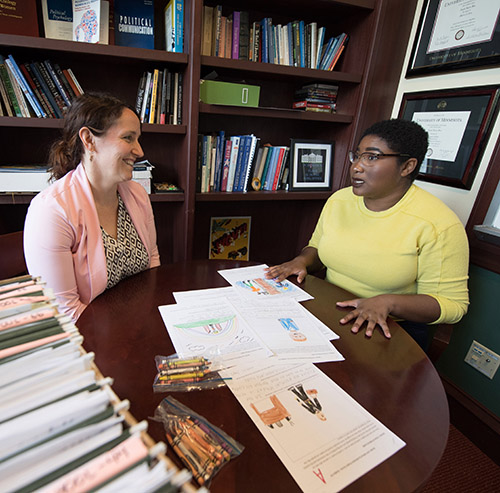
What Happens When You Ask a Child to “Draw a political leader”?

In 1966, social scientist David Chambers began asking elementary school children to draw what they thought a scientist looked like. Out of nearly 5,000 drawings produced over the 10-year course of the study, only 28 – that’s 0.6 percent – depicted a woman.
The good news is that in the five decades since the first child put crayon to paper, as initiatives focused on encouraging young girls’ interest in science have multiplied and women’s participation in scientific fields has increased, so too has the frequency with which they appear in the children’s drawings. In dozens of similar studies conducted since the 1980s, 28 percent of the children, on average, draw female scientists.
For Angie Bos, an associate professor of political science and associate dean of experiential learning, the basic methodology of those “draw a scientist” studies seemed eminently applicable to her scholarly interests, which include women in politics and how the content of civics and political science textbooks influence how students see themselves as political actors. Women remain significantly underrepresented at all levels of U.S. government, and are generally less engaged in political life than men, but while political scientists have long pointed to the importance of early socialization experiences in shaping political attitudes and behavior, there has been no research specifically on how they might contribute to those gender gaps.
So, with collaborators at Brandeis University, Tulane University, and Union College, Bos has developed a research project that asks grade school children to “draw a political leader” in order to answer three central questions: How do early socialization experiences in elementary education shape children’s perceptions of politics as a masculine domain? When do gender gaps emerge? And what are the effects of framing politics in masculine terms, specifically in depressing girls’ intentions to engage in politics?
Over the past year, with the help of students and other volunteers, Bos and her colleagues have completed interviews or surveys with approximately 1,200 first through sixth grade students in Boston, New Orleans, Schenectady, and Wooster. Each was given paper and crayons, and asked to draw what they think of when they picture “a political leader at work.” They were then asked follow-up questions about what the leader was doing in the picture, what the leader does on a typical day, and what three words came to mind when describing that leader. Other questions explored their knowledge of U.S. politics and political leaders, the frequency with which they read or watch television programs about politics, government or history, and gathered basic demographic information.
This summer, thanks to one of the college’s paid research positions, junior psychology major Dzifa Adjei spent eight weeks working closely with Bos to organize, sort, and code the responses from four Wooster-area schools and enter all the data so it can be analyzed further. For Adjei, whose particular academic – and ultimately professional – interest is developmental psychology, this opportunity has been a perfect fit. “The developmental stages of childhood and how kids end up the way they are has always interested me,” she says. “I took multicultural psychology with Dr. Thelamour and I’ve studied a lot about socialization of children of color, but I had never really thought about how it applies to a particular field like this.”
When she was looking for a summer research position this year, the description of Bos’ project caught her eye. “I thought, oh, that’s cool, and like the nerd that I am, I Googled Dr. Bos and read the intro to her book on political psych.” Adjei got her application in just before the deadline, and followed up with an email to tell Bos that even if she didn’t get the position, “I’m super interested in what you’re doing and would love to read the paper you write about this project and go to any presentation you do on it.” That passion paid off, and when Bos told her at the end of her interview that the position was hers, “I was buzzing with excitement!”
Part of that excitement stems from Adjei’s feelings about the significance of the project. “We need new people to be entering politics. We want young girls, especially young girls of color to grow up thinking ‘Hey, I can do this, I can change this’ and starting early enough is so important. They have not been told that they can, and maybe it’s time that someone did.”
Adjei herself has always had a high level of interest in the political arena, and until her first year of college was seriously considering law school as a route to politics. “From an early age, people would say to me, ‘You should be a lawyer,’ in a way I realize now wasn’t entirely complimentary,” she says. But her focus shifted to developmental psychology, where it remains clear and strong, further reinforced by her summer research experience.
“Working with Dr. Bos on this project has given me great insight into what it’s like to do research this big, and helped focus me going into junior year on what area of developmental psychology I’m most interested in.”
Posted in News on July 11, 2018.
Related Posts
Related Areas of Study
Political Science
The study of power, with concentrations in U.S. politics, international relations, political theory and comparative politics.
Major Minor

